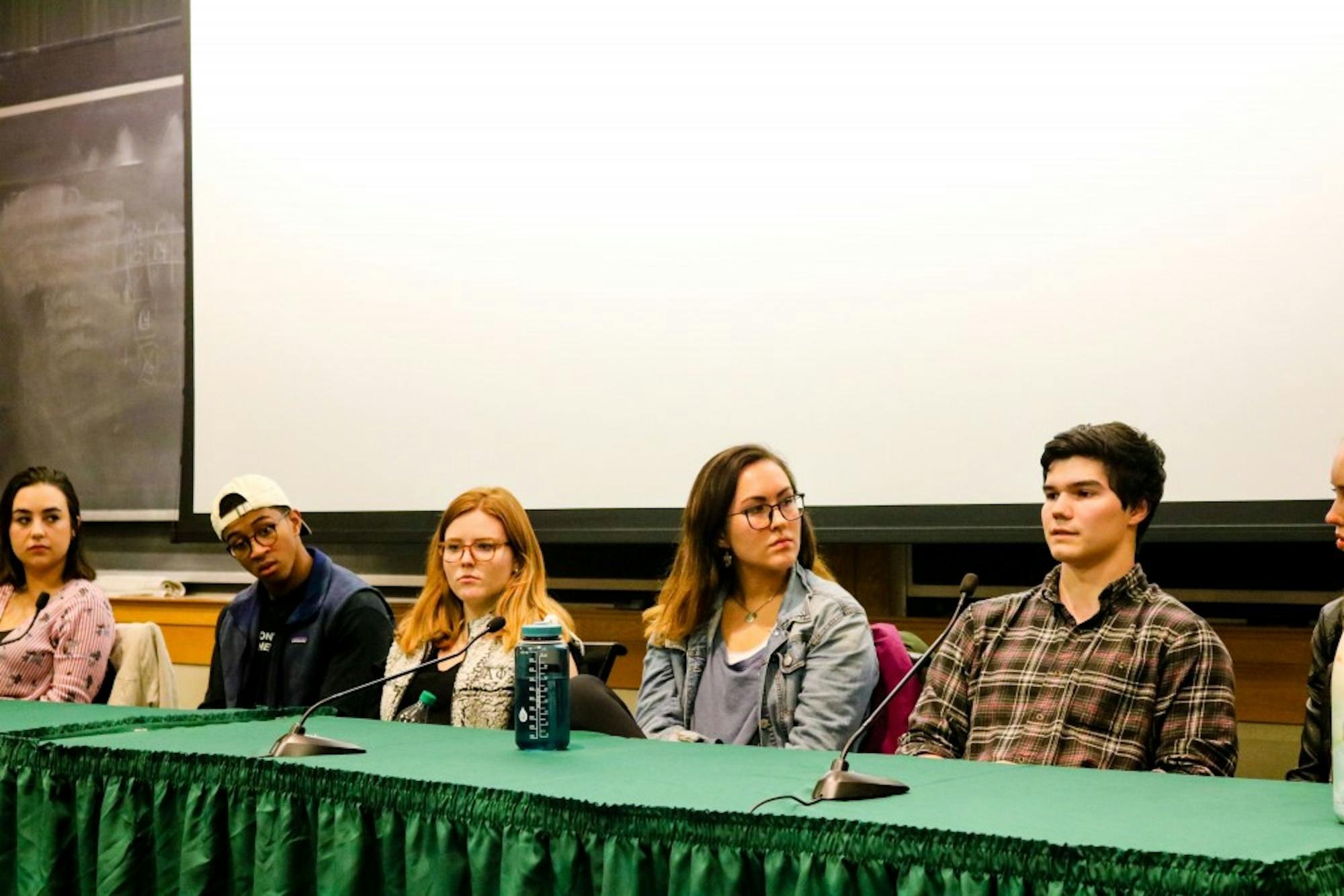On Tuesday night, the Inter-Fraternity and Inter-Sorority Councils hosted a panel informing freshmen about acceptable behavior in Greek spaces in anticipation of the end of the Greek spaces ban in the coming weeks. There was only one thing missing: a complete audience.
The hope was that every freshman interested in entering Greek spaces would attend the meeting. Prior to the panel, both the IFC and the ISC sent campus-wide emails. The IFC email also stated that card scanners would be present at the event and that attendance “may be considered when rushing a Greek House next year.”
Less than 20 students attended the panel.
Wyatt Genasci-Smith ’19, an intern for the Dartmouth Bystander Initiative and a speaker on Tuesday’s panel, expressed his disappointment in finding less than 20 students in the auditorium. He said that the panelists at the event were leaders in Greek spaces and wanted to show they cared.
“We wish we knew these things when we were [freshmen],” Genasci-Smith said. “I’m not happy with the way I conducted myself when I was a freshman.”
The Greek house ban was originally instituted by the Greek Leadership Council in 2013. It prohibits first-year students from entering Greek houses during the first six weeks of their freshman year, or until after Homecoming weekend.
The panel was intentionally composed of leaders from varying houses and backgrounds with different perspectives to bring their own unique outlooks to the panel. Genasci-Smith said that as a white, formerly-affiliated male athlete on campus, his role is instrumental in changing the way freshmen at Dartmouth treat others in Greek spaces and create safer environments.
He noted that the definition of masculinity should be amended to reflect the need to respect women.
“I want it to be a cool thing that guys respect women and other people,” Genasci-Smith said.
IFC head of public relations Caleb Smith ’19 said that the panel’s diversity demonstrated the IFC’s commitment to safety and inclusivity.
The panel stressed that while students can still enjoy the Greek system, they need to be responsible for themselves and for others in those spaces, Smith said.
Of the few freshmen who were in the audience, Angeline Janumala ’22 said she went into the event with a skeptical view of inclusivity in Greek life.
“The leaders try to make [Greek spaces] inclusive, but I think they are probably inherently not,” Janumala said. “Just the whole history of frats and sororities, not just in Dartmouth but in every college and pop culture, is going to turn certain groups of people off from wanting to go into these spaces and feeling like they have a place in these spaces.” However, at the end of the event, she said that she recognized the efforts of the panel to increase the safety and diversity of Greek spaces despite the intrinsic difficulty of that task. Janumala added that the panel made her more confident entering Greek spaces.
“For me, the panel confirmed things that I’ve been hearing in a more concrete way,” she said. “The people that are leading these spaces do care about you and do care about what you think, and if you still end up feeling like a space isn’t valid for you, then that’s your prerogative.”
Although panelists did not foresee the low turnout, Genasci-Smith and Smith said that they are still determined to encourage a culture of awareness within the Greek system.
“People do care — they just feel like someone else is going to do it,” Genasci-Smith said. “It’s like, ‘I care, but honestly I’m not going to be able to create change.’ I’ve heard that a lot. I know that people care, but it’s sad that it would take someone’s best friend getting assaulted or hurt or harmed for them to care.”
While it may take time for all Dartmouth students to fully support the movement toward greater safety and compassion in Greek spaces, the panel demonstrated that leaders are already acting as catalysts in this transformation, according to panelist Rachel Kesler ’19, Inter-Sorority Council co-chair of inclusivity and diversity.
“Everybody had really well-developed thoughts on the ideas we were talking about,” she said. “There are people within the Greek system that really care about the totality of Dartmouth’s community, trying to make these spaces safe for everybody that would like to participate in them.”




